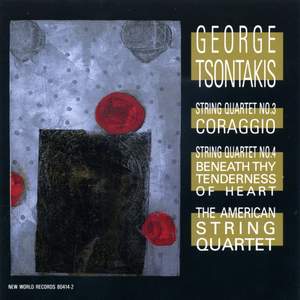"George Tsontakis has the 'luck' of having concrete musical ideas that the ear can perceive and the mind can hold in memory. These ideas tend to be expressed in concentrated, densely packed, nodule-like motives that the composer treats obsessively, and which, as they spread out in time and spin in tight figurational, centripetal orbits, create structure and gesture. Tsontakis has a unique way of suspending high register, slowly evolving chromatic melodic lines over rapidly whirling diatonic figures. This personal use of the age-old combination of slow-against-fast is one of the special delights of these quartets."
-George Rochberg
Composer George Tsontakis (b 1951) studied composition at Queens College with Hugo Weisgall and at Juilliard with Roger Sessions. While his early works were influenced by the dissonant chromatic language favored by Sessions, his musical language later evolved into a classically-influenced style featuring "large-scale harmonic prolongations" which he calls "the timeless gesture." With his Third String Quartet "Coraggio," Tsontakis arrived at a distinctive tonal language driven by an almost classical use of repetition.
In the program note to his Third String Quartet, Tsontakis acknowledges the great contrasts between his Second Quartet (1983) and the Third, which followed two years later. While the Second is a "severely introverted and intense semitonal (atonal) work, submerged in the seemingly inescapable malaise of our time," the Third-which he calls "Coraggio" (courage)-"offers a certain exuberance and brightness, an optimism that might be based on our blindness-a momentary lapse into forgetfulness-to what surrounds us, or else perhaps on the tenacious human spirit we have inherited, where even in the worst of times there is a taking of heart and welling up of courage.
When Tsontakis produced his Fourth Quartet in 1988, the courage to be himself stood undiminished. What he says about his Third-that in accepting "inheritance" (that is, tradition) as an important "factor in the tonal and gestural makeup of the work," he acknowledges freely his "reliance on the stability of diatonically triadic harmonies" and his debt "gesturally...to the work of the late classical masters"-applies with equal force to his Fourth Quartet.
The Fourth Quartet was the winner of a 1989 Kennedy-Center Friedheim Award





